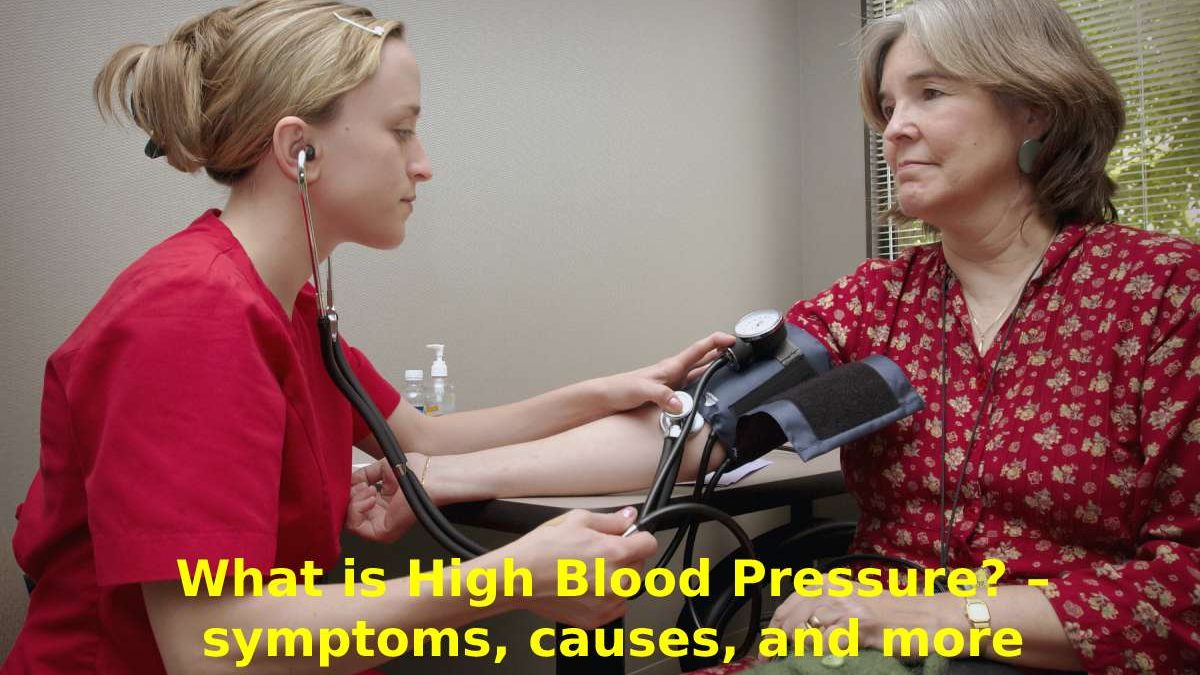Table of Contents
Introduction
High blood pressure is a common situation in which the force of blood against the walls of your arteries over time is high enough to cause health problems, such as heart disease.
Blood pressure is determined by the amount of blood the heart pumps and the degree of resistance to blood flow in the arteries. The more blood your heart pushes and the thinner your routes are, the higher your blood pressure. The blood pressure reading is determined in millimetres of mercury (mm Hg). It has two numbers.
- Upper value (systolic pressure). The first, or top, measures the pressure in the arteries when the heart beats.
- Lower value (diastolic pressure). The second, or lower, measures the pressure in the arteries between heartbeats.
Symptoms
Many peoples with high blood pressure have no signs or symptoms, even if blood pressure senses reach dangerously high levels.
Some people with high blood pressure may have headaches, shortness of breath, or nose bleeds, but these signs and symptoms are not specific. Usually, they do not occur until the disorder reaches a severe or life-threatening stage.
Causes
There are two kinds of high blood pressure
Primary (Vital) Hypertension
In most adults, there is no identifiable cause of high bp. Instead, this type of high blood pressure, called primary (essential) hypertension, usually develops gradually over many years.
Secondary Hypertension
Some persons have high bp caused by an underlying disease. This kind of high blood pressure, secondary hypertension, tends to come on suddenly and causes higher blood pressure than primary hypertension. A variety of disorders and medications can cause secondary high blood pressure, including:
- Obstructive sleep apnea
- Renal disease
- adrenal gland tumours
- thyroid problems
- Particular birth (congenital) defects in the blood vessels
- Certain medicines, such as birth control pills, cold medicines, decongestants, over-the-counter pain relievers, and some prescription drugs
- Illicit drugs, such as cocaine and amphetamines
Risk Factor’s
High blood pressure has many risk factors, such as:
Age
The risk of high blood pressure rises as you age. Until near age 64, high bp is more common in men. Women are more likely to grow high bp after 65.
Race
High blood pressure is widespread in people of African descent and often appears at a younger age than in white people. Serious complications, such as strokes, heart attacks, and kidney failure, are also more common in people of African descent.
Family background. High bp is usually hereditary.
Overweight or Obesity

The extra you weigh, the more blood you need to supply oxygen and nutrients to your tissues. As the sum of blood flowing through the blood vessels increases, so does the pressure on the walls of the arteries.
Lack of Physical Activity
People who are not physically active tend to have a higher heart rate. The higher the heart rate, the more complex the heart must work with each contraction and the greater the force on the arteries. Therefore, a lack of physical activity also increases the risk of being overweight.
Tobacco Use
Smoking or chewing tobacco not only immediately increases bp temporarily, but the chemicals in tobacco can damage the lining of the artery walls. As a result, it can cause the narrowing of the arteries and increase the risk of heart disease. Passive smoking can also raise the risk of these diseases.
High salt (sodium) is the content in your diet. Too much sodium in your diet can reason your body to retain fluid, which increases blood pressure.
Insufficient Amount of Potassium in Your Diet
Potassium helps stabilise the amount of sodium in cells. A proper balance of potassium is critical to maintaining good heart health. If you don’t get enough potassium from your diet or lose too much potassium due to dehydration or other conditions, sodium can build up in your blood.
Excessive Alcohol Consumption
Over time, excessive drinking can damage the heart. In addition, drinking more than one drink a day for women and more than two a day for men can affect bp.
If you consume alcohol, do so in moderation. For healthy adults, moderate drinking means one drink daily for women and two for men. One glass is equal to 12 ounces (350 mL) of beer, 5 ounces (147 mL) of wine, or 1.5 ounces (44 mL) of 80-proof liquor.
Stress
High levels of stress can cause a temporary increase in bp. In addition, stress-related habits, such as overeating, smoking, or drinking alcohol, can cause your bp to rise further—certain chronic diseases. Certain chronic diseases can also increase your risk of high bp, including kidney disease, diabetes, and sleep apnea.
Conclusion
The arterial condition is the furrow of your armpit against the opposite of the parades of your arteries. When your heart beats later, the bombardment of the arteries hits. Your prescription is even higher when your heart is late, bombarded with tears. It is a systematic prescription.

